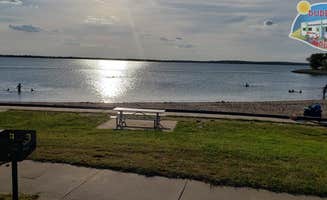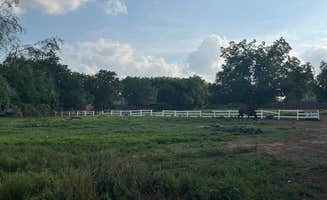Ray Roberts Lake State Park provides horse campgrounds near Plano, Texas with both developed and primitive camping options. The equestrian campsites are concentrated within specific loops, offering direct access to an extensive trail network. Trail surfaces vary from sandy terrain to hardpack soil and occasional rock features. Primitive sites in certain areas require advance reservations, especially during peak weekends in spring and fall.
What to do
Trail riding through diverse terrain: At Johnson Branch Campsites — Ray Roberts Lake State Park, riders can explore trails with varying difficulty levels. "Lots of hiking trails. You really can't go wrong with Johnson Branch on Lake Ray Roberts," notes Chris P. The trail system includes wooded sections with elevation changes and open meadow segments.
Lakeside swimming spots: Find relief from Texas heat with swimming areas located near equestrian sites. At Johnson Branch, one camper mentioned, "We found Lake Ray Roberts as a nice swimming spot near Dallas to go cool down during the hot Texas summers." Many swim spots include natural beach areas where horses can also access water.
Explore connected parks: The Pilot Knoll Park Campground offers additional trails connected to the Ray Roberts system. "We stayed in spot#5 right at the end of the cove. Calm water, large lot land area and clean, easy access to walk right into the lake to swim, and space to dock your boat make the cove side of the park an excellent score," reports Monica C.
What campers like
Well-spaced campsites: Isle du Bois Campsites — Ray Roberts Lake State Park receives high marks for site spacing and natural setting. One camper noted, "The sites are spaced a good distance apart and really give you a feel of isolation." Another mentioned, "The sites vary from being 20 feet from the parking lot to half a mile out or so, but most people flock to the more formal campsites and miss out thinking they'll have to hike in."
Wildlife viewing opportunities: The parks around Plano offer frequent wildlife sightings, especially deer. As Tony C. observed at Isle du Bois, "Deer will approach your campsite and you're likely to see all kinds of wildlife." Horse campers should secure feed supplies as wildlife may be attracted to grain.
Year-round accessibility: Unlike some seasonal horse camps, the equestrian sites remain open throughout the year. According to a December visitor to Isle du Bois, "There are few campers here in December. Restrooms were clean. Campsites, large and private." This makes winter an excellent time for avoiding crowds on the trails.
What you should know
Varying maintenance conditions: Facilities at East Fork Park Campground show inconsistent upkeep. "The roads are in need of repair, with numerous potholes, some very large, but the attendant did say that the park was on the CoEs list for repairs," reports Ray & Terri F. Equestrian campers should check recent trail conditions before planning trips.
Reservation requirements: Most equestrian camping areas require advance bookings, especially during weekends. Sites fill quickly during spring wildflower season and fall color changes.
Water access limitations: Some waterfront sites have challenges with lake access. One review noted, "The platforms are extremely in disrepair - literally falling into the lake." Horse owners should scout water access points before allowing animals near shore areas.
Tips for camping with families
Playground access: Loyd Park provides family-friendly facilities near horse trails. "Beach area and playgrounds are great, although you do have quite a few 'day users,'" mentions Randy H. This makes it suitable for families mixing horse activities with traditional camping recreation.
Site selection strategy: Choose sites with natural shade features during summer months. "There are trees- some large enough to provide some shade if desired, but most small enough to allow satellite reception," one camper observed at East Fork Park.
Educational opportunities: Johnson Branch offers interpretive programs specifically focused on local ecology. "We learned what native plants we can eat!" shared Sarah E. after camping with Cub Scouts. These programs often include information about local wildlife and habitat management practices.
Tips from RVers
Site leveling challenges: Many equestrian sites with RV hookups require careful leveling. At Cedar Hill State Park Campground, one reviewer noted, "The park is designed with small loops for 15-20 camp sites in each loop. Very little traffic right by the individual spots." However, another mentioned, "We were surprised to find a very sloping site with the cement bumpers missing rebar and very unsafe."
Electrical service considerations: RV campers should verify which sites offer 50-amp service if bringing larger rigs. "Larger rigs are more accommodated next to the lake. But call ahead to see which sites have 50 amp, you'll need it in summer time," advises John B. regarding Loyd Park's facilities.
Corral configurations: Horse corrals at developed sites typically accommodate 1-2 horses per site. Some areas allow portable corral systems for those with larger horse trailers or multiple animals.



